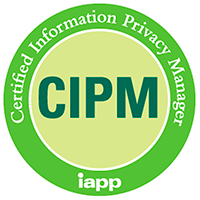CIPM
Certified Information Privacy Manager
- Description
- Course Learning Objectives
Course Description
Certified Information Privacy Manager (CIPM)
The CIPM is the world’s first and only certification in privacy programme management. When you earn a CIPM, it shows that you know how to make a privacy programme work for your organisation. In other words, you’re the go-to person for day-to-day operations when it comes to data protection.
The CIPM program was developed by the International Association of Privacy Professionals (IAPP), which is the world’s largest comprehensive global information privacy community and resource. The CIPM certification also holds accreditation under ISO 17024: 2012.
Who should attend?
- Data Protection Officers
- Data Protection Managers
- Auditors
- Legal Compliance Officers
- Security Manager
- Information Managers
- Anyone involved with data protection processes and programmes
Are you GDPR Ready?
The General Data Protection Regulation (GDPR) takes effect in 2018, are you ready for it?
There’s a lot to know, there’s a lot at stake and there’s a lot of opportunity for data protection professionals with the right training and education.
Achieving a CIPM credential shows that you have a practical and comprehensive knowledge of how data protection programmes should work across an organization.
The Certified Information Privacy Professional/Europe (CIPP/E) credential focuses on the regulations that govern data protection programmes.
Adding the CIPP/E to your CIPM puts you at the forefront of ensuring your are ready for the GDPR.
Course Learning Objectives
What will you learn?
The course is broken into ten modules:
Module 1: Introduction to privacy program management
Identifies privacy program management responsibilities, and describes the role of accountability in privacy program management.
Module 2: Privacy governance
Examines considerations for developing and implementing a privacy program, including the position of the privacy function within the organization, role of the DPO, program scope and charter, privacy strategy, support and ongoing involvement of key functions and privacy frameworks.
Module 3: Applicable laws and regulations
Discusses the regulatory environment, common elements across jurisdictions and strategies for aligning compliance with organizational strategy.
Module 4: Data assessments
Relates practical processes for creating and using data inventories/maps, gap analyses, privacy assessments, privacy impact assessments/data protection impact assessments and vendor assessments.
Module 5: Policies
Describes common types of privacy-related policies, outlines components and offers strategies for implementation.
Module 6: Data subject rights
Discusses operational considerations for communicating and ensuring data subject rights, including privacy notice, choice and consent, access and rectification, data portability, and erasure and the right to be forgotten.
Module 7: Training and awareness
Outlines strategies for developing and implementing privacy training and awareness programs.
Module 8: Protecting personal information
Examines a holistic approach to protecting personal information through privacy by design.
Module 9: Data breach incident plans
Provides guidance on planning for and responding to a data security incident or breach.
Module 10: Measuring, monitoring and auditing program performance
Relates common practices for monitoring, measuring, analyzing and auditing privacy program performance.